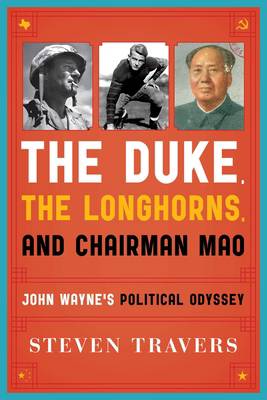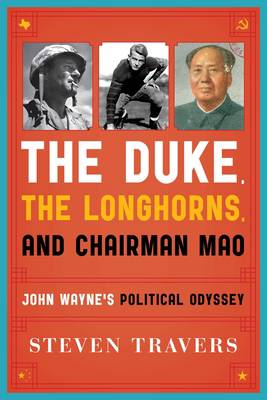
- Afhalen na 1 uur in een winkel met voorraad
- Gratis thuislevering in België vanaf € 30
- Ruim aanbod met 7 miljoen producten
- Afhalen na 1 uur in een winkel met voorraad
- Gratis thuislevering in België vanaf € 30
- Ruim aanbod met 7 miljoen producten
Zoeken
The Duke, the Longhorns, and Chairman Mao
John Wayne's Political Odyssey
Steven Travers
Hardcover | Engels
€ 26,45
+ 52 punten
Omschrijving
1966. The year of change. The year of division. The middle of the 1960s, the great dividing line between what America had been, and what it became. All of it, in all its color, glory, and ugliness, came symbolically together on a hot, humid weekend in Austin, Texas. The protagonist? None other John "Duke" Wayne, the larger-than-life movie hero of countless Westerns and war dramas; a swashbuckling, ruggedly macho idol of America; the very embodiment of what the United States had become--the new Rome: the most powerful military, political, and cultural empire in the annals of mankind. Wayne, like the nation itself, stood astride the world in Colossus style, talking tough. Taking no prisoners. In September 1966, John Wayne was in Texas filming War Wagon while the integrated Trojans of the University of Southern California arrived in Austin to do battle with a powerhouse of equal stature, the all-white Texas Longhorns. The Duke, a one-time pulling guard for coach Howard Jones at USC, was there, accompanied by sycophants, and according to rumor, with spurs on. Wayne arrived in Austin the night before the game. Dressed to the nines, he immediately repaired to the hotel bar. He had a full entourage who hung on his every word as if uttered from the Burning Bush. So it was when the Duke ordered his first whiskey. Thus surrounded by sycophants, John Wayne bellowed opinions, bromides, and pronouncements. What happened next is subject to interpretation, for this weekend and many other details of the Duke's "Trojan wars" are revealed and expounded upon by longtime USC historian Steven Travers. This book is a fly-on-the-wall exploration of this wild weekend and an immersion into the John Wayne mythology: his politics, his inspirations, the plots to assassinate him, his connections to Stalin, Khrushchev, and Chairman Mao, and the death of the Western.
Specificaties
Betrokkenen
- Auteur(s):
- Uitgeverij:
Inhoud
- Aantal bladzijden:
- 288
- Taal:
- Engels
Eigenschappen
- Productcode (EAN):
- 9781589798977
- Verschijningsdatum:
- 7/04/2014
- Uitvoering:
- Hardcover
- Formaat:
- Ongenaaid / garenloos gebonden
- Afmetingen:
- 161 mm x 231 mm
- Gewicht:
- 544 g

Alleen bij Standaard Boekhandel
+ 52 punten op je klantenkaart van Standaard Boekhandel
Beoordelingen
We publiceren alleen reviews die voldoen aan de voorwaarden voor reviews. Bekijk onze voorwaarden voor reviews.








